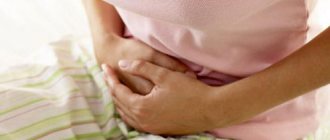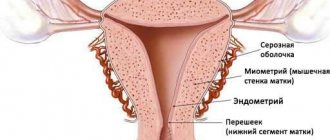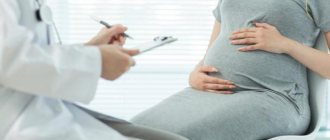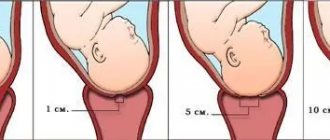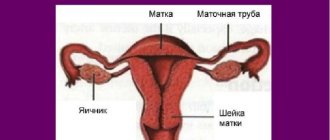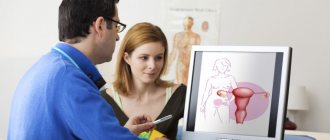Unpleasant sensations after ovulation
A tingling sensation in the abdomen before the onset of the ovulatory period is considered completely normal.
It occurs due to the fact that during the cycle a follicle is formed in the ovary, it grows under the influence of hormones and when it matures, it bursts. The rupture of the follicle and the release of the egg leads to the appearance of unpleasant symptoms. Tingling or pain appears on one side as the ovaries alternately oculate.
Why it stings in the uterus, signs of pathology:
- Severe pain in the lower abdomen.
- Increased body temperature.
- Bleeding.
Blood loss should be copious, since minor bleeding may occur during ovulation. It is considered a normal phenomenon, since the ovarian membrane is enveloped in capillaries; when they rupture, they are damaged, and a small amount of bloody discharge appears.
If there is a lot of blood, severe pain, or discomfort occurs, then you should urgently consult a doctor. The doctor will help determine the cause of discomfort and diagnose the presence of pathology at an early stage of development.
Methods for getting rid of unpleasant sensations:
- it is worth taking painkillers;
- resort to the help of antispasmodics.
Pain is an alarming sign that should be taken as a “signal”; the appearance of unpleasant sensations can be eliminated with the help of various medications. This will help alleviate the woman’s condition for a while. But if the discomfort does not go away, unpleasant symptoms bother you with a vengeance or appear with alarming frequency, then you should consult a gynecologist.
The main signs of pathology during ovulation
- Severe pain in one side.
- The appearance of blood in the middle of the menstrual cycle.
- An increase in the intensity of discharge and a change in its quality (it can be copious and emit an unpleasant odor).
The reasons for the appearance of unpleasant sensations can be different; do not forget that tingling is not always a sign of pathology.
Hormonal reasons
If colitis is in the uterus, the causes may be hormonal. The duration of the menstrual cycle depends on the current level of progesterone and estrogen in the female body. An imbalance leads to an increase in the duration of bleeding and also increases the accompanying pain syndrome. Hormonal imbalances can cause the uterus to contract and cause pain in this area.
If the examination of the vaginal smear does not reveal the presence of an inflammatory process, then the woman is prescribed a blood test for hormones. And based on the results of the tests, the specialist selects a hormone replacement drug.
Colitis in the uterine area after long periods as a result of hormonal imbalance caused by abnormalities in the thyroid gland. To confirm the diagnosis, a determination of the level of thyroid hormones is prescribed.
Recommendations
There are quite a few reasons why the uterus colitis. They can be both physiological and pathological. In order not to miss a serious illness, if such a symptom develops, it is recommended to consult a specialist.
If tingling occurs in the uterine area, you need to remember the following:
- If the cause of the condition is ovulation, then such sensations will recur only after a month. If pathology develops, tingling will resume much earlier.
- Before being examined in a gynecological chair, it is highly undesirable to take any painkillers. Taking medications can blur the symptoms and make a preliminary diagnosis more difficult. In addition, self-medication can lead to serious consequences.
- If tingling is associated with pregnancy, then confirmation is necessary. Taking drugs at the beginning of gestation can cause severe malformations in the fetus.
The stabbing pain felt by a woman in the uterine area is always an alarming sign. It allows the doctor to judge the presence of certain abnormalities.
If a woman notices a delay in menstruation and stabbing pain that becomes unbearable, then this sign may signal an ectopic pregnancy.
It is worth remembering that such sensations can occur even in completely healthy women. But in any case, doctors recommend seeking medical help if such symptoms develop.
Diseases accompanied by such symptoms respond well to treatment in the early stages of their development. In advanced cases, a woman may experience severe consequences.
If stabbing pain in the uterine area occurs only after menstruation ends, then there is no cause for concern. Most likely, the cause of the condition is the hormonal surge occurring during this period.
If stabbing pain continues for a long time, it is recommended to visit a gynecologist’s office. And it is necessary to undergo an examination as quickly as possible if the condition is accompanied by pathological discharge, bleeding and increased body temperature. Such symptoms may indicate the development of a serious pathology.
If the uterus tingles or pain appears in the lower abdomen, then you should consult a gynecologist. Since the pain syndrome does not bother you out of the blue, unpleasant sensations arise due to the presence of pathology and more. The sensations may be disturbing during pregnancy or during ovulation.
Tingling in the uterus: causes of stabbing pain
Anyone can experience pain in one or another internal organ.
Many people let this situation take its course, use painkillers and hope that this condition will not happen again.
However, it is worth considering the fact that pain is a kind of sign that our body gives us, informing us that there has been a malfunction in its work.
By not paying attention to such signals, a person provokes the further development of diseases that can lead to various kinds of complications. Representatives of the fairer sex should pay special attention to their health.
One of the signals that women need to pay attention to first is tingling in the uterus.
If a woman feels discomfort in the uterus, she should immediately consult a doctor, as advanced diseases can lead to infertility.
Tingling in the uterus can have various causes and appear at different times. A woman may feel tingling:
- before menstruation;
- during menstruation;
- after menstruation;
- after ovulation;
- during pregnancy.
The uterus and its structure
The uterus is a smooth muscle, hollow organ located in the pelvic area, its shape resembles a pear and is intended for bearing a fetus during pregnancy.
Uterus dimensions:
- In a previously nulliparous woman, the uterus weighs 50 grams, and after childbirth, this figure increases to 100 grams. during the dormant period - its length does not exceed 7-8 cm, width - 5 cm.
- During gestation, the size of the uterus increases - its walls stretch up to 32 cm, and the hollow organ itself is capable of supporting the weight of the fetus up to 5 kg.
On each side, her body is supported by ligaments, providing anatomically sufficient movement during the period of gestation.
Its structure consists of the body and the neck, the isthmus - in many women it is tilted forward. The part of the organ located above the level of origin of the tubes is the fundus, on the right/left side at the very bottom there are its lateral edges, the upper ones are the corners of the uterus.
Structure of the walls of the uterus:
- The endometrium is the inner layer of the uterus. Its thickness varies from 1 to 3 mm. and it is penetrated by glands, produces secretions and is renewed during menstruation.
- The muscular, inner layer is the myometrium. It undergoes changes during gestation and its thickness does not exceed 3-10 mm.
- The outer layer is the serous membrane in the uterus and the peritoneum, which is attached to the posterior/anterior wall.
Delay in the initial stages as a sign of pregnancy
During pregnancy, the body begins to rebuild, so the shape of the body changes slightly. Already in the first days, mother feels differently subconsciously. The body gives signals, and the absence of menstruation only confirms the presence of pregnancy.
There are cases when a delay indicates that a woman is pregnant. This is called hormonal imbalance.
The role of the uterus in a woman’s life
The uterus performs the following functions:
- Protection of the above genital organs and peritoneum from infections penetrating from the vagina
– in this case, the cervical canal takes on this role.
- Regular, spontaneous cleansing of the uterine cavity and cervical canal, vaginal cavity - we are talking about regular menstruation.
- Participation in sexual intercourse and creation of favorable conditions for the movement of sperm through the cervical canal into the uterus and its cavity, fallopian tubes.
- Implantation of the fertilized egg into the uterine cavity and the creation of favorable conditions for the development of the fetus throughout the entire period of pregnancy, participation in the process of natural childbirth.
- Due to the ligamentous apparatus itself, it forms and strengthens the pelvic floor , supporting the internal organs located above it.
But as noted earlier, its most important function is reproductive , creating favorable conditions for bearing and giving birth to a child.
Prevention
To eliminate painful periods, it is recommended to carry out preventive measures. For example, avoid a sedentary lifestyle and do not abuse alcohol. You should also give up smoking, drinking strong coffee and tea.
An important aspect is the normalization of nutrition. It is recommended to eat foods with unsaturated fatty acids or replace them with ready-made vitamins from the pharmacy.
Do not forget about timely hygiene of the genital organs - it should be done twice a day.
Tingling in the uterus
As a phenomenon, tingling in the uterus can occur at any time during a woman’s life. This signal from the body may indicate the course of a number of pathological processes and should not be ignored, contacting a doctor in a timely manner and undergoing an examination.
As doctors note, such a symptom can occur in the body against the background of delayed menstrual flow - in this case, doctors say that it can be provoked by:
- Cyst or disorders caused by hormonal changes;
- Myoma or erosion affecting the cervix;
- Inflammation localized in the pelvic organs and systems.
Most women in this case do not pay attention to the tingling sensation, take antispasmodics and that’s where it all ends.
But such self-medication is a fight against the consequence, but not the root cause of tingling in the uterus, and is allowed as a one-time salvation. If such a symptom shows itself with enviable regularity, you should immediately visit a doctor.
Inflammation of the cervix (cervicitis)
Adnexitis is an inflammatory disease of the appendages, the development of which is provoked by infectious pathogens. Young women aged 20-30 years are at risk for this disease.
Cervicitis is a very dangerous disease of the pelvic organs of the fairer sex, which is characterized by an inflammatory process of an infectious nature. Inflammation develops in the mucous membrane of the cervix, and such an unpleasant symptom appears as a tugging of the uterus.
The main causes of tingling in the uterus
The reasons that provoke pathological tingling in the uterus can be very different - from inflammation and delayed menstruation to malignant neoplasms.
Before your period
In this case, we are talking about the individual characteristics of the functioning of internal organs and the reproductive system.
Pathological diseases cannot be excluded:
- If the pathological process is accompanied by frequent trips to the toilet or a delay in a woman’s menstruation, inflammation of the urinary system most likely develops. If tingling is accompanied by heavy bleeding between menstruation or discharge of pus, you should immediately consult a gynecologist.
- The cause of tingling can be endometriosis and cancer, cystitis and pyelonephritis. Most often, endometriosis provokes unpleasant sensations - tingling will be accompanied by attacks of nausea and vomiting, loss of appetite and general weakness, increased pain during sexual intercourse or defecation. In any case, you should not ignore this symptom - in the absence of timely diagnosis and treatment, advanced pathology can cause female infertility.
During your period
Tingling in the uterine cavity during menstruation may indicate an inflammatory process in the genitourinary system or a hormonal imbalance. Therefore, it is worth limiting all physical activity and getting proper rest, taking antispasmodics.
Negative symptoms - tingling in the uterus during menstruation can be a consequence of:
- hormonal imbalance and inflammation of the pelvic organs and systems.
- erosion and cystic neoplasms.
- with uterine fibroids.
After ovulation
Ovulation is a natural, physiological process of the release of a follicle from the ovary of a mature egg, completely ready for subsequent fertilization by a sperm.
This is one of the main stages in the menstrual cycle and the very tingling in the uterine cavity during this period of the cycle may indicate pregnancy even before the actual delay of menstruation.
Although negative symptoms and disruption of the ovulation period may be a consequence of inflammation, the focus of which is localized in the pelvic organs.
It can also be triggered by:
- malfunction of the adrenal cortex and thyroid gland.
- benign/malignant neoplasms in the pituitary gland or hypothalamus.
- after suffering stress.
The very absence of ovulation can be a consequence of disturbances in the menstrual cycle, for example, after an abortion or miscarriage, or as a consequence of amenorrhea and dysfunctional types of uterine bleeding.
During pregnancy
Tingling in the uterine cavity in the first trimester of pregnancy can cause concern for many women, although doctors reassure expectant mothers, noting that this is a symptom indicating a restructuring of the body.
The reason may be the following:
- Immediately after fertilization, the fertilized egg attaches to the walls of the uterine cavity and begins to actively grow, leading to stretching of its walls and, accordingly, tingling. If the unpleasant sensations do not cause concern and do not manifest themselves as a noticeable pain symptom, the situation should not cause the woman to panic.
- Also, tingling in the uterine cavity during pregnancy can be caused by bloating and increased gas production in a woman. In this case, the doctor recommends adjusting your own diet and physical activity, and giving proportional exercise.
- In the 2nd and 3rd trimester , tingling in the uterine cavity may indicate growth and pressure of the fetus on the internal organs.
- At 37-38 weeks of pregnancy, tingling in the uterine cavity indirectly indicates an imminent birth.
How to protect yourself from pain before your period starts?
The basic rules for preventing pain in the lower abdomen before menstruation come down to maintaining the correct rhythm of life and eliminating bad habits:
1. make a choice to quit smoking and drink alcohol, especially before your period begins.
2. Try to properly distribute your workload; you need to get enough sleep.
3. Regular physical activity, alternating with proper rest, can virtually eliminate the likelihood of pain.
4. Take vitamins. In order to avoid discomfort and unpleasant sensations in the lower abdomen, it is worth consuming sufficient quantities of vitamin E, A and group B. In addition, it would be useful to introduce into the diet foods in which the content of these vitamins is quite high. This can be fish and seafood, dried fruits and nuts, spinach, oatmeal, as well as cheeses and cottage cheese.
5. If you are overweight, you need to be prepared for the fact that pain before the onset of menstruation can occur quite often. That is why it is worth monitoring your weight, preventing obesity and taking care of your own health.
6. Limit the consumption of salty foods, as salt retains fluid in the body, causing swelling and creating additional discomfort in the lower abdomen.
Nice tingle
Doctors call tingling in the uterine cavity of a pregnant woman within normal limits if the latter:
- in their flow they resemble the touch of the tip of a thin needle;
- the sensations themselves manifest themselves exclusively during physical or emotional stress;
- have an exclusively short-term, sharp nature of their course and do not disturb constantly;
- other negative signs and sensations are absent in their manifestation.
Doctors consider such phenomena to be the norm - the fetus grows and stretches the walls of the uterus, muscles and fibers of nearby organs, provoking a tingling sensation.
Such pain is short-lived and goes away with a change in body position - in its manifestation and course it is short-lived and not intrusive, it manifests itself in the evening or night hours.
Otherwise, you should visit a gynecologist and undergo an examination.
Second trimester
During the second trimester, the situation with tingling in the lower abdomen is different. During this period, there is a significant increase in the uterus, which leads to compression of the stomach and intestines. As a result of this, a pregnant woman may experience some disturbances in the digestive process, manifested in heartburn, constipation and other conditions.
It is problems with the gastrointestinal tract that cause tingling, which from a medical point of view is considered normal at this stage of pregnancy.
While expecting a baby, any woman should feel comfortable, so unwanted colic can be eliminated quite simply by adhering to a certain diet and daily routine.
First of all, it is necessary to exclude foods that cause gas formation from the diet. These products include legumes, white bread, cabbage in any form, grapes, walnuts, and potatoes.
The main food products should be vegetables and fruits enriched with vitamins and nutrients that do not increase gas formation. From flour products you can eat coarse bread.
Naturally, lean meat and fish should be on the menu of the expectant mother. It is also recommended to consume fermented milk products, which have a positive effect on the intestinal microflora.
Compotes made from various dried fruits without added sugar will be very useful not only in the second trimester, but also throughout the entire period of pregnancy.
To prevent stagnation in the intestines, doctors recommend minor physical activity in the form of walking, as well as light exercise aimed at stimulating intestinal function.
In the middle of pregnancy, the fetus begins active movements, felt by the woman in the form of light tremors, which can be easily confused with tingling caused by disturbances in the digestive process.
Therefore, you should not panic, but rather listen carefully to your body.
Bad tingling
Bad tingling and nagging pain in the lower abdomen lasting more than 3 hours should alert a pregnant woman.
Source: https://gidroz.ru/matka/pokalyvanie-v-matke-pered-mesyachnymi.html
Is chest pain normal?
Let's figure out how many days before your period your breasts hurt. The underlying cause of pain in the mammary glands is a change in the correctness of the process of producing sex hormones. Ideally, a woman’s breasts should not hurt. The severity of such changes, in combination with environmental factors, determines the development of certain pathologies of the mammary glands. Pain before menstruation may appear in the following cases:
- Mastodynia accompanied by premenstrual syndrome. In addition to chest pain, women, as a rule, have other complaints (increased blood pressure, headaches, swelling of the legs and arms, psycho-emotional disorders, etc.). In such a situation, the specialist assesses the severity of PMS and prescribes complex therapy, taking into account all the patient’s complaints.
- The body's response. Under the influence of prolactin and progesterone in the second phase of the cycle, the mammary glands slightly enlarge due to stagnation of venous blood and stromal edema, and women may experience soreness in the breasts, but this should not last more than 4 days if they feel normal. When the menstrual phases change, when the ratio of hormones changes again, the discomfort disappears. In this case, the patient does not require specific treatment.
Many women are concerned about the question of how many days before their period their breasts hurt. Mammologists give the following answer: if everything is in order with health, then soreness of the mammary glands occurs 4 days before menstruation. Other options are considered pathology.
Also, women often wonder what the basal temperature should be before menstruation.
Light, barely noticeable attacks of cramps during menstruation are indeed considered normal. This is due to the physiological process of renewal of the uterine mucosa - the endometrium. Until the moment of ovulation, the endometrium actively grows, forming a favorable environment for the attachment of the embryo if fertilization suddenly occurs.
At this time, the egg is born and goes to the uterine cavity to meet the sperm there. Let's assume that conception did not take place. Then the uterus restarts the whole process all over again. The endometrium dies, peels off, and then, together with the spent egg, must be expelled.
If the girl’s health is normal, then the sensations in her stomach will not be so strong as to deprive her of the ability to do her usual activities. What about the pain that literally shoots through your stomach, making it difficult to even get out of bed?
In addition, you may experience dizziness, nausea, intestinal upset, and a general feeling that something is wrong. Gynecologists call this dysmenorrhea or algodysmenorrhea - a syndrome of irregular menstruation that cannot be ignored.
Pain of physiological etymology
Often pain in the lower abdomen occurs during menstruation.
If the pain is tolerable, has a pressing, spastic nature, and the discharge is of medium abundance and without clots, a physiological peculiarity of the body is often stated. You can ask your doctor to prescribe a suitable antispasmodic. Otherwise, you should undergo a gynecological examination - perhaps there are some hidden diseases of the reproductive organs. For physiological reasons, uterine pain also occurs in the following situations:
- During the period of ovulation, when the egg matures and leaves the follicle. Similar discomfort occurs on the 14th day after menstruation, in the middle of the cycle.
- A few days after conception, when the fertilized egg attaches to the uterine wall. It is believed that young women experience pain more often if they are in early pregnancy.
- During intensive fetal growth. Sometimes pain begins in the early stages of pregnancy, if the woman has had illnesses or damage to the body of the uterus, adhesions are present.
- Closer to the birth of the baby. Gestation ends and contractions begin, causing discomfort.
There is no danger if these are training contractions. But the uterus can also hurt due to the threat of spontaneous abortion or premature birth. Therefore, it is worth consulting with your doctor.
Unpleasant sensations in the form of spasms are possible after childbirth and are also natural. This is how the organ tries to regain its previous shape. They intensify during breastfeeding due to a reflex response to nipple stimulation.
Symptoms appear during and after menstruation
The uterus hurts after menstruation due to a hormonal imbalance in the body. The level of hormones in the blood rose sharply and then decreased. As a result, unpleasant discomfort arose in the intimate area.
Tingling in the uterus before menstruation also appears against the background of an increase in the level of hormones in the blood. But these unpleasant sensations quickly pass. As soon as the level of hubbub stabilizes.
If this does not happen, then it’s time to see a doctor and take a hormone profile. Instability of hormonal levels can occur due to:
- Taking oral contraceptives.
- A recent abortion (no more than 1 year has passed since the procedure).
- The fact that not long ago a woman gave birth to a child (no more than 6 months have passed since the birth).
- A recent miscarriage (at least 6 months after the miscarriage occurred).
All of the above conditions lead to changes in the level of hormones in the blood. The body will need some time to recover. When the hormonal levels stabilize, the tingling will disappear.
If the discomfort does not disappear, the symptoms continue to increase, then it is necessary to urgently visit a gynecologist, since only he will be able to determine exactly why the pain occurred.
But tingling in the cervix before and after menstruation occurs due to the fact that the cervical canal expands before menstruation. When the bleeding ends, the cervix narrows, if there are erosive changes on it, then pain may occur.
Menstruation
The occurrence of pain before the onset of menstruation is one of the main complaints with which women come to see a gynecologist. If the pain recurs regularly and begins to appear a couple of days before the start of menstruation, this means that pathological processes have begun to develop in the uterus, affecting not only the cavity, but also the appendages and cervix. If pain occurs before the onset of menstruation, you should consult a doctor. Self-diagnosis is impossible due to the fact that for an accurate diagnosis it is necessary to take tests and undergo an examination.
Regular pain may indicate the development of diseases such as endometriosis, cancer, pyelonephritis, cystitis, etc.
One of the symptoms of endometriosis is acute tingling, which can be observed against the background of dysmenorrhea. In this case, the pain is accompanied by nausea, vomiting, general weakness, migraine, dizziness, lack of appetite, etc. Pain may occur during bowel movements or during sexual intercourse.
Pain in the uterus can signal an inflammatory process, in which purulent discharge is often observed. With uterine cancer, stabbing pain may not appear immediately and is often accompanied by bleeding.
To reduce pain, sedatives or antispasmodics are recommended. In any case, it is necessary to remember that these remedies only help temporarily relieve pain, but are not able to cure the disease. Only a visit to a specialist, tests and examination will be able to identify the causes that cause pain in the uterus itself, in its cervix and appendages. After diagnosis, the doctor will prescribe appropriate treatment. It is worth noting that advanced diseases are more difficult to cure. They can lead to a lot of complications, one of which is infertility.
Pain during menstruation may indicate:
- hormonal imbalances;
- inflammatory processes;
- erosion process;
- cysts;
- fibroids.
To relieve pain, you can use antispasmodics (drugs that relieve spasms of smooth muscles) and painkillers. But you should not self-medicate, as this may worsen the situation. Only a specialist can prescribe the necessary treatment. For example, if tingling in the uterus is caused by hormonal disorders, the doctor may prescribe a course of hormonal medications, which are prescribed individually according to indications after the necessary studies.
Position of the uterus
As a rule, the position of the uterus does not change before menstruation. It always remains unchanged, with the exception of pathological conditions in which its bending or drooping develops. Many women note that the uterus drops before menstruation, but this theory has not been confirmed by medicine. Experts explain that the feeling that the uterus has dropped causes swelling of its tissues before menstruation and excessive accumulation of fluid in the body. This is also evidenced by the neck, which becomes larger in size and can be felt even with independent palpation. The most common position of the organ in medicine is called the “anteflexio” position and occurs in approximately 70% of women.
Colic during pregnancy
During pregnancy, the cervix tingles as it closes, and certain changes in the condition may be associated with this phenomenon. Tingling also occurs during implantation of the fertilized egg; the unpleasant sensations do not bother you for long. They are not much of a concern and pass quickly.
Some women perceive pain as the first sign of pregnancy, and they are partly right. Sensations arise even before the delay occurs, since immediately after implantation certain hormonal changes occur in the body.
Stitching pain in the uterus should be considered a sign of pathology if it is accompanied by unpleasant symptoms:
- spotting or bleeding;
- change in general condition (weakness appeared, health worsened).
During pregnancy, the stomach also hurts due to the fact that the ligaments diverge; this happens in the 2nd trimester. At 1 such pain should not occur.
So, what is this tingling? Sign of pathology or normal phenomenon? Nominally, the appearance of such sensations is not considered a pathology; pain can be bothersome in the early stages for various reasons: increased hormone levels, implantation, etc.
But if the sensations are strong, then you should not endure the pain, as it may be a harbinger of a miscarriage.
Common reasons
If the uterus has colitis, the causes may be various inflammatory processes in the organs of the female reproductive system. During a visit to the gynecologist, the doctor will conduct an examination and take a vaginal smear for examination.
An increase in the level of leukocytes always indicates the presence of inflammation.
If the uterus colitis immediately after the end of monthly bleeding, then the reasons may be:
- endometritis;
- cyst;
- endocervicitis;
- myomatous formation in the body of the uterus.
Stitching pain in the uterus can also occur due to the development of cancer or hormonal imbalances.
Why else can stabbing uterine pain occur? Often the cause is cervical erosion. This condition can be caused by:
- human papillomaviruses;
- infections of bacterial origin.
To make a diagnosis, the woman will undergo a colposcopy procedure.
During the examination, severe damage to the mucous layer of the vaginal segment of the cervix is revealed. To exclude oncopathology, additional tests are prescribed. Most often, the cause of erosion is a certain strain of human papillomavirus.
The uterus also colitises if menstrual blood enters the abdominal cavity through the fallopian tubes. Adenomyosis is also a cause of stabbing pain in the uterine area.
The reasons for colitis in the area of the uterus may be its bending, underdevelopment or incorrect position caused, for example, by adhesions.
